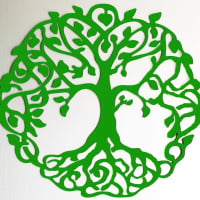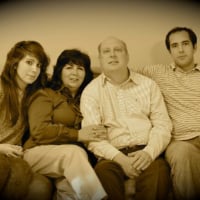Request for what happen with my memories when I died.
I know when I died my children will not have access to the living memories I add to them because my children have not the same FamilySearch number.
Is it possible to give access to my children to the living memories I add even it's not the same FamilySearch number so that when I will pass away they will have still access to the memories I add to them ?
from Marcel
Answers
-
You could always share your login information with them.
😊
0 -
Sharing your log-in credentials is a violation of the Terms of Service. https://www.familysearch.org/en/help/helpcenter/article/how-do-i-share-information-on-family-tree
1 -
1
-
technically speaking linking a memories item to a living person - does NOT in and of itself - make an item totally private/secure. What makes is totally private and secure is MARKING it as private.
For example if you put your items that were linked to Living people in a FS album - and you gave the url of that album to someone else - they can see those items (NOW and when you are dead) - that is if they are not marked as "private"
DONT assume - just because you link an item to a living person that somehow it is 100% private (though people will not be able to navigate to it by traversing the family tree) - they can possily find it using the FIND option in FS Memories.
the link https://yanceyfamilygenealogy.org/when_you_pass_away.htm discusses this and various other factors.
as to whether sharing a password is in "violation of terms of use" - I think there may be places where it says that is it is (as cited above) - However - if you actually read the terms of use -it does NOT say that
https://www.familysearch.org/legal/terms in fact it implies you could share you password with others - simply that if you do - you are still responsible for its use.
In all of my communcations with FS Tech support - I have never really had any one tell me that sharing your password - with a close trusted family member (for emergency purposes) was in direct violation of terms of use. Though of course you need to be very cautious if you do share it.
I have also never seen in explicit Terms of use verbiage - as to whether or not a single account can be shared by a couple - such as man and wife. Though I really totally agree that it is best if they dont share the acocunt - because the profile info on an account represents one person not two or more.
also it use to be that an LDS church account was the same account that was used in FamilySearch - and there were indeed reasons for not sharing your LDS(church) account - such as acess to financial transactions. But LDS Church accounts are no longer the same as FS accounts.
But personally I dont think FS is going to revoke someone's access for violation of terms simply because they shared a password with their spouse or children as an example. Though I do think that there are some places where FS is giving "mixed messages" on this subject.
2 -
For now, I would definitely use albums to share these memories with your children.
I have an album for each of my children. Every memory, with them in it, is added to their album. (If there's multiple kids in a photo, the photo goes into each of their albums.) I have shared their album links with them, so they can view their memories at any time.
They could also tag themselves in each photo, if they wanted to do so. So far, they haven't felt the need to.
Like Dennis said, if I don't mark the photo as "Private" it can be searched for on the "Find" page, or with a search engine, like Google. Only the living "person tags" will be hidden from view.
In the future, new features are being designed and built to (hopefully) assist families with sharing their memories and controlling who can see them in an even better way. I can't wait!
1 -
"tagging themselves" - I dont think would make any sense . . .
the only people who would see such tags are THEM alone.
1 -
@Dennis J Yancey It's true that only the living person who tags themselves can see those tags. But it is indeed useful. Then those memories appear in the Memories section of their own profile, making it easier to access those Memories. There are some old photos of me as a child where I have a hard time telling whether it is me or my brother, so once the tag is in place, I don't have to figure that out again.
Also, if I participate in the upcoming Family Group Trees feature, there will probably be a way for me to bring those tags for my living person into the shared tree, so the tagging work I've done already will benefit others in the group.
And since I am a Church member, at my death my profile will be marked public, and then those tags will also become public, so my tagging will be visible to everyone.
Some of this is speculative, and clearly doesn't apply to everyone, so tagging their own memories won't seem worthwhile to some users, but it can indeed make sense.
0 -
Valid Points :-) though as you point out in your case - few people seem to think its worth the effort.
0 -
@Dennis J Yancey When I first came across this discussion, I didn't follow the link to your page at https://yanceyfamilygenealogy.org/when_you_pass_away.htm . I just did. That's a helpful page, but I'd like to make some notes:
- In item 3g, you speculate "It probably isn't even allowed by the system to mark a root person as deceased." That's actually 100% true -- no need for the "probably." No user can mark their root person as deceased. Period.
- The biggest omission is on the topic of private persons in the case of an LDS user who passes away, when their account is marked as deceased. At that point, the root person associated with that account is marked public. That is the one exception (but a very important exception) to the general rule that when a user's account is locked at their passing, private persons created by that account will be private forever. So an LDS user can indeed profitably make contributions to their own root person during their life and those contributions will have value when they die. I don't think there is a corresponding capability for non-LDS users, even though there is a provision for family members to contact FamilySearch and have their account locked after they die.
- I would note also that Ron Tanner has mused that perhaps at some point when the private persons created by a now-locked account become some age (150 years was the last age I heard Ron speculate), FamilySearch might mark them deceased and thus make them public. But that's certainly not the case now, and might well never happen.
1 -
Allen:
I have a bit of confusion on the wording of your second bullet
if a person has marked any MEMORIES items as PRIVATE - those items will remain private - no matter what. Unless somehow someone were to unmark them as private - and that wont normally happen if the person is LDS and deceased and the account locked.
This is true even if such memories items were linked to the deceased LDS person's profile - which for LDS their profile is now public (but their memories items marked as private are STILL private).
Any items that were NOT marked as Private and were hooked to the deceased persons profile - yes - those would be viewable when navigating to the desceased persons now public profile.
keep in mind when I say "PRIVATE" - I am usually referring to Private memories (memories explicitly marked as private). I am not talking about "private" people (people in the private space). The difference is critical to understand.
** what makes a memories item private - is that it is explicitly marked as private. That is not the same thing as an item linked to a private person - in this latter case - the memories item is actually still public - unless the memory itself is marked as private. (even though you wont be able to navigate to the item by navigating the family tree - you can still actually get to it by doing a MEMORIES FIND as an example or if you have the url)
But It should also be noted that even if a person uploaded something to FS Memories - that item is not automatically hooked to their profile - unless they explicitly tag it to their own profile while they are alive. In other words - just because a person dies - doesnt mean it will be easy to see all of their uploaded items - which may or may not be hooked to any profile at all and may be near impossible to find - unless you can fidn them with a keyword search - and that only works if key words were entered on the title and description.
0 -
I wasn't talking about private memories at all. You're right that those are private no matter what, regardless of which tree persons they might be tagged to.
I was simply talking about the deceased person's root person -- their own profile.
Since the original post in this conversation was about private memories, I probably should have chosen a different forum to respond to the omissions on your website. That would have reduced the confusion for you and anyone else reading this discussion. My apologies to all.
0 -
yes - you are right - the profile for the root person of the LDS deceased - does become public.
My focus was mostly on their uploads to FS Memories as well as their recorded "living persons"in their private space.
also of importance to know
even LDS - can create a NONLDS account - if they want to avoid the automatic account closure at death.
0




